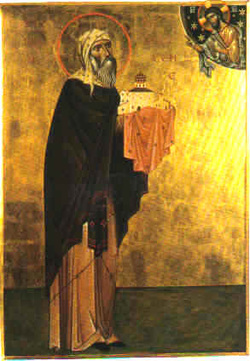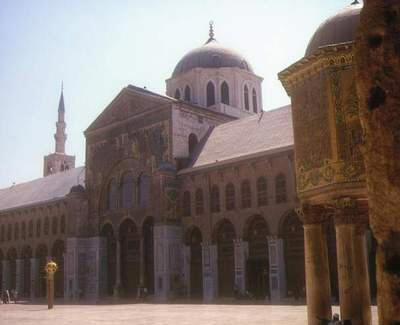
As a monk John set a bright example to all the others, especially as regarded lowliness and obedience. He sought for the lowest offices in the community, as though they were in a peculiar sense his own, and fulfilled them with the greatest care. When he was sent to Damascus to sell baskets made by himself, he welcomed the mockery and jests of the lowest classes in that city where he had before time been charged with the most honourable offices. He was so devoted to obedience that he not only started up to obey every nod of his superiors, but also never thought it right to ask the reason of any duty laid upon him, however difficult or however strange it might be. While thus living he never ceased earnestly to defend the Catholic doctrine as to the honouring of holy images. For this reason he drew upon himself the hatred and persecution of the Emperor Constantine Copronymus, as he had first done that of the Emperor Leo the Isaurian, and this all the more because he freely rebuked the arrogance of these Emperors, who must needs take in hand matters concerning the faith, and pronounce sentence upon them according to their own judgment.
It is a marvel how many things John devised both for the protection of the faith, and for the encouragement of godliness, and expressed in his writings both in prose and verse. He was worthy of the high praise which was given him by the Second Council of Nice. On account of the golden streams of his eloquence, he was surnamed Chrysorrhoas, or John of the golden streams. It was not against the enemies of holy images alone that he defended the orthodox faith. He fought stoutly against the Acephali, the Monothelites, and the Theopaschites. He maintained the laws and the power of the Church. He taught with great learning the Primacy of the Prince of the Apostles, and many times calleth him the Pillar of the Churches, the unbroken rock, and the Teacher and Ruler of the world. The whole of his writings are not only steeped in learning and teaching, but have a certain savour or simple piety, especially when he is praising the Mother of God, toward whom he was filled with a special reverence and love. But the greatest praise of John is that he was the first who arranged in order a complete course of theology, and prepared the way in which holy Thomas Aquinas hath so clearly dealt with the whole body of sacred doctrine. This truly holy man, full of days and good works, fell asleep in the peace of Christ about the year of salvation 754. The supreme Pontiff, Leo XIII, established his office and Mass throughout the universal Church, whereof he also gave him the title of doctor.





